人教版(2019)必修第二册Unit 4 History and Traditions Discovering Useful Structures(共34张ppt)
文档属性
| 名称 | 人教版(2019)必修第二册Unit 4 History and Traditions Discovering Useful Structures(共34张ppt) | 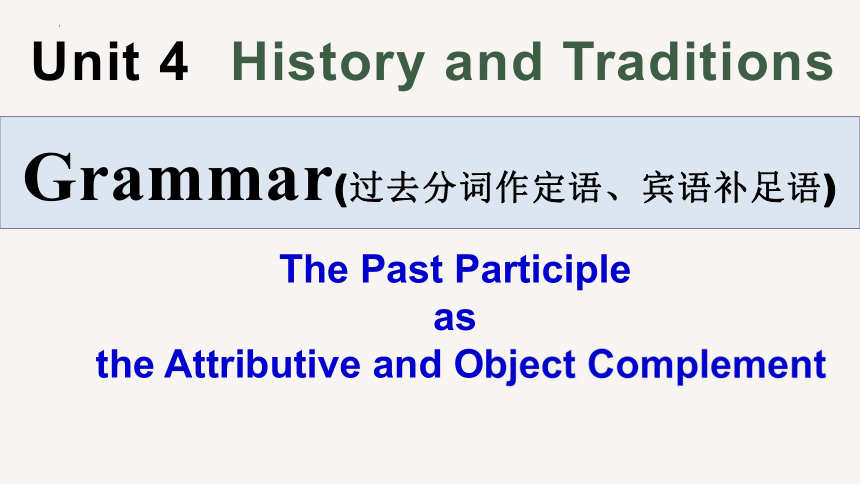 | |
| 格式 | pptx | ||
| 文件大小 | 3.4MB | ||
| 资源类型 | 教案 | ||
| 版本资源 | 人教版(2019) | ||
| 科目 | 英语 | ||
| 更新时间 | 2024-07-17 11:00:03 | ||
图片预览


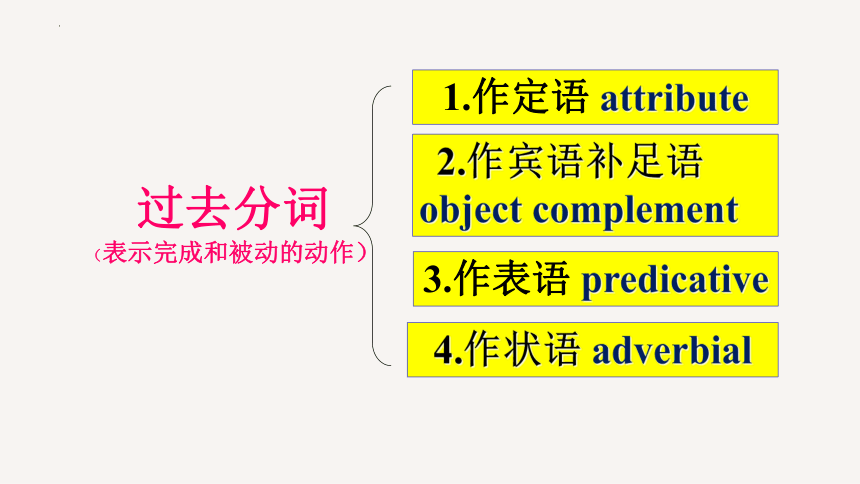
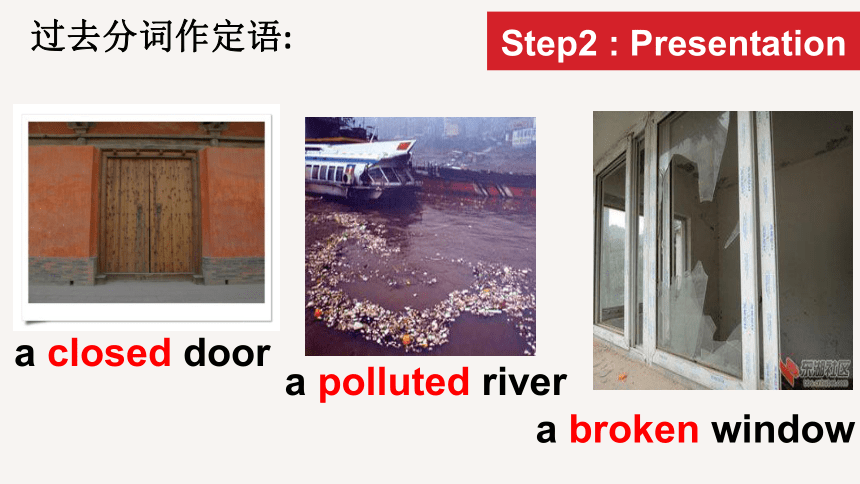
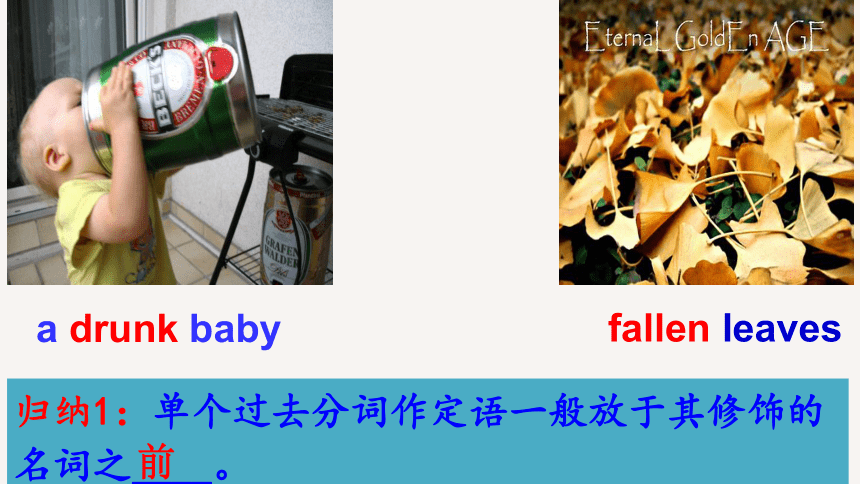
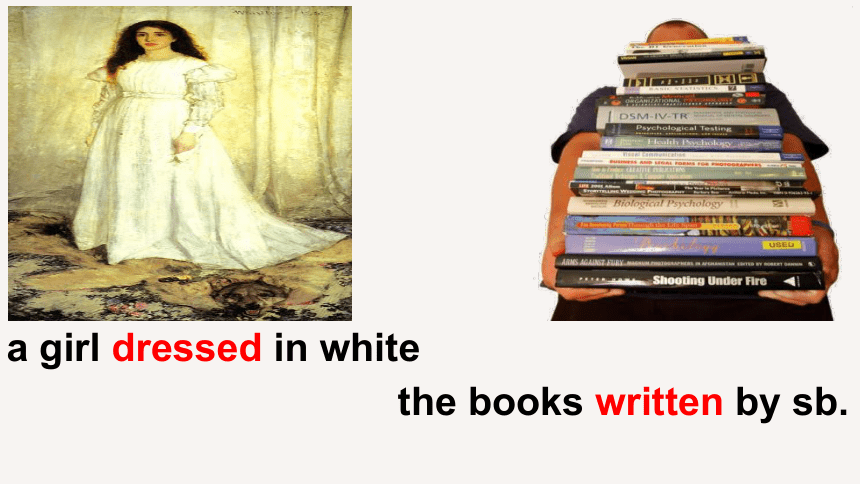
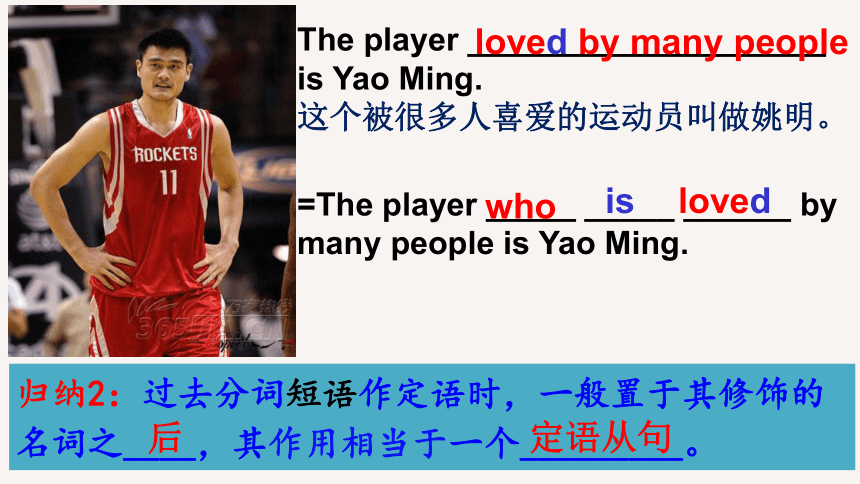
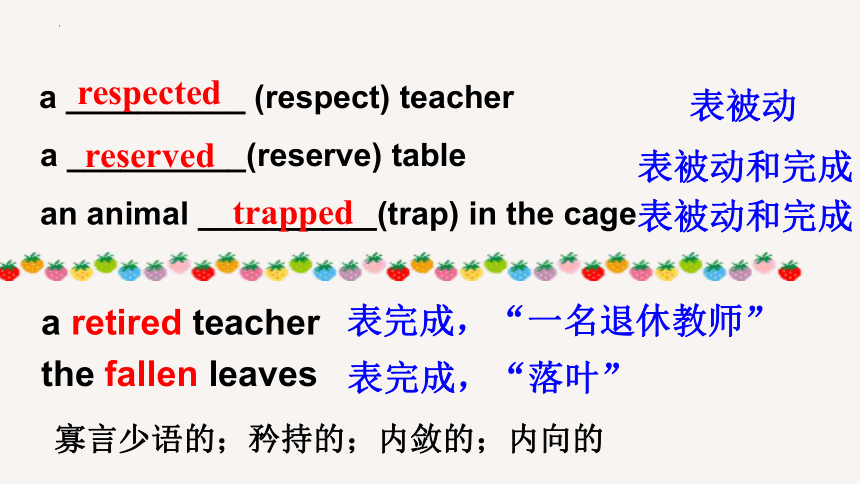

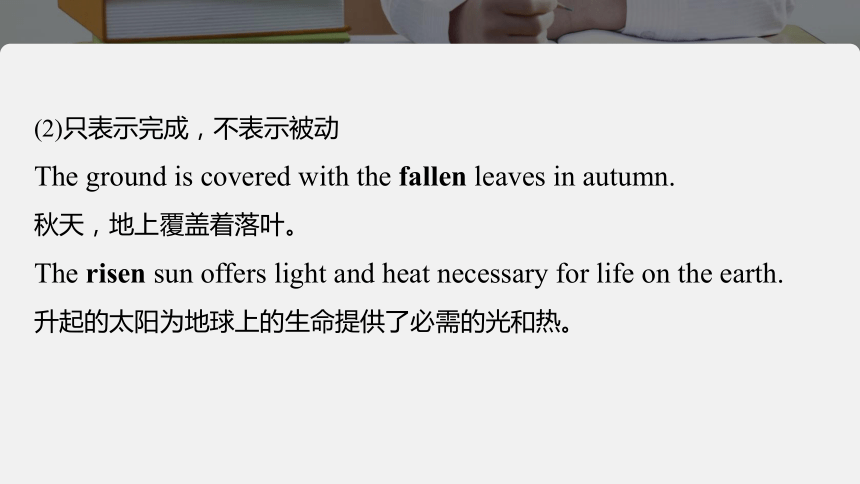
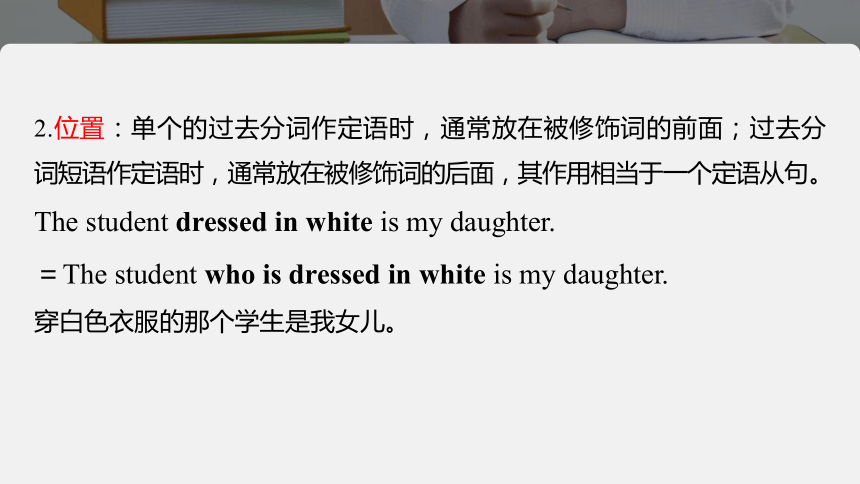
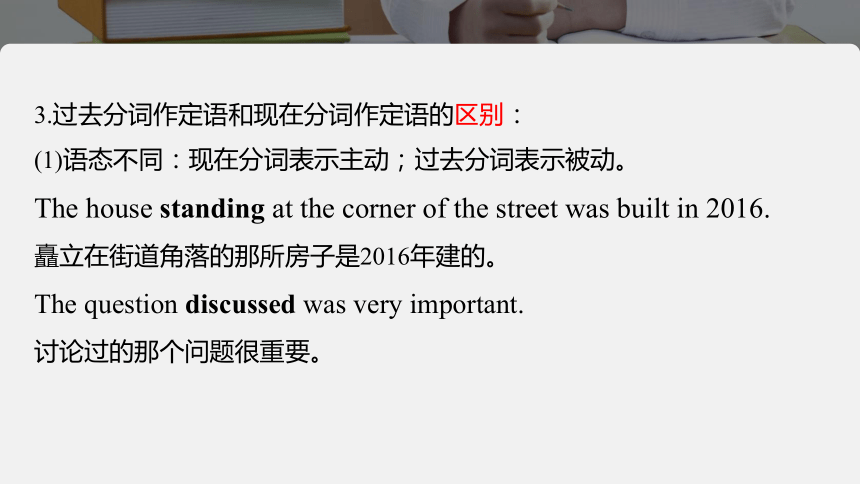
文档简介
(共34张PPT)
Unit 4 History and Traditions
Grammar(过去分词作定语、宾语补足语)
The Past Participle
as
the Attributive and Object Complement
※过去分词是非谓语动词的一种形式,表示完成和被动的动作。它在句子中可以充当定语、表语、状语、补足语等成分;不当主语与宾语。
Step1:Lead-in
过去分词的形式(the form of past participle):
do - did - done
一般式--过去式--过去分词
4.作状语 adverbial
1.作定语 attribute
3.作表语 predicative
2.作宾语补足语
object complement
过去分词
(表示完成和被动的动作)
a closed door
a broken window
a polluted river
Step2 : Presentation
过去分词作定语:
fallen leaves
a drunk baby
归纳1:单个过去分词作定语一般放于其修饰的名词之____。
前
a girl dressed in white
the books written by sb.
=The player _____ _____ ______ by many people is Yao Ming.
The player ____________________ is Yao Ming.
这个被很多人喜爱的运动员叫做姚明。
who
loved
is
loved by many people
归纳2:过去分词短语作定语时,一般置于其修饰的名词之____,其作用相当于一个_________。
定语从句
后
a __________ (respect) teacher
a __________(reserve) table
an animal __________(trap) in the cage
respected
reserved
trapped
表被动
表被动和完成
表被动和完成
a retired teacher
the fallen leaves
表完成,“一名退休教师”
表完成,“落叶”
寡言少语的;矜持的;内敛的;内向的
一、过去分词作定语
1.意义:及物动词的过去分词作定语往往表示被动和完成;不及物动词的过去分词作定语不表示被动,只表示完成。
(1)表示被动和完成
Many used cars are on sale now,and you can go to find a good one.
很多二手车现在正在甩卖,你可以去找一辆好车。
语法精讲
(2)只表示完成,不表示被动
The ground is covered with the fallen leaves in autumn.
秋天,地上覆盖着落叶。
The risen sun offers light and heat necessary for life on the earth.
升起的太阳为地球上的生命提供了必需的光和热。
2.位置:单个的过去分词作定语时,通常放在被修饰词的前面;过去分词短语作定语时,通常放在被修饰词的后面,其作用相当于一个定语从句。
The student dressed in white is my daughter.
=The student who is dressed in white is my daughter.
穿白色衣服的那个学生是我女儿。
3.过去分词作定语和现在分词作定语的区别:
(1)语态不同:现在分词表示主动;过去分词表示被动。
The house standing at the corner of the street was built in 2016.
矗立在街道角落的那所房子是2016年建的。
The question discussed was very important.
讨论过的那个问题很重要。
(2)时间关系上不同:现在分词表示动作正在进行;过去分词表示动作已经完成。
the changing world变化着的世界
the changed world改变了的世界
boiling water沸腾的水
boiled water开水 cold boiled water 凉白开
developing countries发展中国家
developed countries发达国家
4.过去分词(done)、现在分词的被动语态(being done)与动词不定式的被动语态(to be done)作定语的区别:
过去分词 done 被动关系,动作已经完成
现在分词 doing 主动关系,动作正在进行
being done 被动关系,动作正在进行
不定式 to do 主动关系,动作尚未发生
to be done 被动关系,动作尚未发生
The building built last year is our classroom building.
去年建造的楼是我们的教学楼。
The building being built now is our classroom building.
现在正在建造的楼是我们的教学楼。
The building to be built next month is our classroom building.
下个月将要建造的楼是我们的教学楼。
二、过去分词作宾语补足语 (敲黑板,很重要!!!!)
1.过去分词用在表状态的动词keep,leave等的后面作宾语补足语。
He got up late and hurried to his office,leaving the breakfast untouched.
他起得很晚,没吃早饭就匆匆忙忙地去了办公室。
2.过去分词用在使役动词have、get和make的后面作宾语补足语。
(1)“have/get+宾语+过去分词”可以表示两种含义:“让别人做某事”或“遭遇到某种不幸”。
Claire had/got her luggage checked an hour before her plane left.
在飞机起飞前一个小时克莱尔(让安检员)对她的行李进行了安检。
While they were on holiday,they had/got their car broken into.
他们在度假时,汽车被撬开了。
(2)在“make+宾语+过去分词”这种结构中,过去分词表示结果。
They managed to make themselves understood by using very simple English.
他们用很简易的英语来设法使自己被理解。
3.感官动词see,hear,notice,observe,watch,feel,find等后,可用过去分词作宾语补足语。
When we saw the road blocked with snow,we decided to spend the holiday at home.
当我们看到道路被雪封住后,我们决定在家度过假期。
The next morning people found the world outside their houses completely changed.
第二天早上,人们发现他们房子外面的世界全变了样。
4.表示“意愿;命令”的动词,如like,want,wish,expect,order等后可用过去分词作宾语补足语。
The manager ordered the work finished at the end of this week.
经理要求在本周末完成这项工作。
5.过去分词用在“with+宾语+宾语补足语”这一结构中,过去分词与宾语之间是动宾关系。
The living room is clean and tidy,with a dining table already laid for a meal to be cooked.
客厅既干净又整洁,已摆好了餐桌准备盛放待煮的饭菜。
John received an invitation to dinner,and with his work finished,he gladly accepted it.
约翰收到一份宴请函,正好他的工作也做完了,于是他就欣然接受了邀请。
6.非谓语动词(短语)作宾语补足语的区别:
(1)感官动词(短语)see,watch,observe,look at,notice,hear,listen to,feel等的宾语补足语主要有三种形式(以hear为例):
I heard her singing an English song when I passed by her room yesterday.
昨天经过她房间时,我听见她正在唱英文歌。(主动、正在进行)
I heard her sing an English song just now.
刚才我听见她唱了一首英文歌。(主动、完成)
To learn English well,we should find opportunities to hear English spoken as much as possible.
为了学好英语,我们应该尽可能多地找机会听别人讲英语。(被动、无时间性)
(2)使役动词make,have,get,keep后加复合宾语的比较:
do sth. 让……做某事(主动)
done让……被做(被动)
①make+宾语+
The shocking news made me realize what terrible problems we would face.
这个令人震惊的消息使我意识到我们将面临多么可怕的问题。
I made myself known to them first and then we talked about our hobbies.
我先向他们做了自我介绍,然后我们谈论了我们的爱好。
do sth. 使……做某事(主动)
doing sth. 使……持续做某事(主动、进行)
done使……被做(被动)
②have+宾语+
Mother had me go to the shop and buy some salt.
妈妈让我去商店买些食盐。
He had us laughing all through the meal.
整顿饭下来他让我们笑个不停。
My elder sister had her wallet stolen on a bus last month.
上个月,我姐姐的钱包在公共汽车上被偷了。
to do sth. 使……做某事(主动)
doing sth. 使……开始做某事(主动)
done使……被做(被动)
③get+宾语+
He got me to post the letter for him.
他让我替他寄信。
The captain got the soldiers moving toward the front after a short rest.
休息了片刻之后,上尉让士兵们开始朝前线行进。
I’ll get my cellphone repaired tomorrow.
我明天要(请人)修一下我的手机。
doing sth. 使……一直做某事(主动、进行)
done使……被做(被动)
④keep+宾语+
I’m sorry to have kept you waiting so long.
对不起,让你久等了。
She kept her eyes shut and stayed where she was.
她紧闭双眼,待在原地未动。
sb. /sth. doing(主动、进行)
sth. done(被动、完成)
sth. to do(表示将来)
with+
WeChat is like a public network,with people sharing information publicly.
微信像是一个公开网络,人们公开分享信息。
(3)with复合结构中宾语补足语的比较:
With a great weight taken off her mind,she passed all the tests successfully.
由于放下了极大的思想包袱,她成功地通过了所有考试。
John received an invitation to dinner, and with his work __________(finish), he gladly accepted it.
2. ---Did Peter fix the computer himself
---He had it _______(fix), because he doesn’t know much about computers.
3.I was wondering why they kept the door ________ (lock) for such a long time.
finished
fixed
locked
Step3:Practice
4.This is the first time that I have heard the poem _______ (speak) in English.
5. With the task____________(finish),we had a happy weekend.
6. Helen had to shout to make herself__________ (hear) above the sound of the music.
7.I don’t want the children ______ out in such weather.
spoken
finished
heard
taken
8. Linda found her house ___________ into when she came back. (break )
9. The murderer was brought in, with his hands _____ behind his back. (tie)
10. Tom, did you see anyone ____________out of the classroom (go)
11. One of his teeth aches painfully, so he wants it ___________out. (pull)
12. At night, I suddenly heard someone _____________ into my bedroom. (walk)
walking / walk
broken
tied
go / going
pulled
13. This is the first time that I have heard the poem ______ in English. (speak)
14. On the top of the hill, I could see smoke _____ from the chimneys in the village. (rise)
15. I was wondering why they kept the door _____ for such a long time. (lock)
16. The little girl felt someone _____ her on the shoulder. (pat)
17. My brother had that door _______ last week. (paint)
painted
spoken
rising
locked
pat
Thanks
Unit 4 History and Traditions
Grammar(过去分词作定语、宾语补足语)
The Past Participle
as
the Attributive and Object Complement
※过去分词是非谓语动词的一种形式,表示完成和被动的动作。它在句子中可以充当定语、表语、状语、补足语等成分;不当主语与宾语。
Step1:Lead-in
过去分词的形式(the form of past participle):
do - did - done
一般式--过去式--过去分词
4.作状语 adverbial
1.作定语 attribute
3.作表语 predicative
2.作宾语补足语
object complement
过去分词
(表示完成和被动的动作)
a closed door
a broken window
a polluted river
Step2 : Presentation
过去分词作定语:
fallen leaves
a drunk baby
归纳1:单个过去分词作定语一般放于其修饰的名词之____。
前
a girl dressed in white
the books written by sb.
=The player _____ _____ ______ by many people is Yao Ming.
The player ____________________ is Yao Ming.
这个被很多人喜爱的运动员叫做姚明。
who
loved
is
loved by many people
归纳2:过去分词短语作定语时,一般置于其修饰的名词之____,其作用相当于一个_________。
定语从句
后
a __________ (respect) teacher
a __________(reserve) table
an animal __________(trap) in the cage
respected
reserved
trapped
表被动
表被动和完成
表被动和完成
a retired teacher
the fallen leaves
表完成,“一名退休教师”
表完成,“落叶”
寡言少语的;矜持的;内敛的;内向的
一、过去分词作定语
1.意义:及物动词的过去分词作定语往往表示被动和完成;不及物动词的过去分词作定语不表示被动,只表示完成。
(1)表示被动和完成
Many used cars are on sale now,and you can go to find a good one.
很多二手车现在正在甩卖,你可以去找一辆好车。
语法精讲
(2)只表示完成,不表示被动
The ground is covered with the fallen leaves in autumn.
秋天,地上覆盖着落叶。
The risen sun offers light and heat necessary for life on the earth.
升起的太阳为地球上的生命提供了必需的光和热。
2.位置:单个的过去分词作定语时,通常放在被修饰词的前面;过去分词短语作定语时,通常放在被修饰词的后面,其作用相当于一个定语从句。
The student dressed in white is my daughter.
=The student who is dressed in white is my daughter.
穿白色衣服的那个学生是我女儿。
3.过去分词作定语和现在分词作定语的区别:
(1)语态不同:现在分词表示主动;过去分词表示被动。
The house standing at the corner of the street was built in 2016.
矗立在街道角落的那所房子是2016年建的。
The question discussed was very important.
讨论过的那个问题很重要。
(2)时间关系上不同:现在分词表示动作正在进行;过去分词表示动作已经完成。
the changing world变化着的世界
the changed world改变了的世界
boiling water沸腾的水
boiled water开水 cold boiled water 凉白开
developing countries发展中国家
developed countries发达国家
4.过去分词(done)、现在分词的被动语态(being done)与动词不定式的被动语态(to be done)作定语的区别:
过去分词 done 被动关系,动作已经完成
现在分词 doing 主动关系,动作正在进行
being done 被动关系,动作正在进行
不定式 to do 主动关系,动作尚未发生
to be done 被动关系,动作尚未发生
The building built last year is our classroom building.
去年建造的楼是我们的教学楼。
The building being built now is our classroom building.
现在正在建造的楼是我们的教学楼。
The building to be built next month is our classroom building.
下个月将要建造的楼是我们的教学楼。
二、过去分词作宾语补足语 (敲黑板,很重要!!!!)
1.过去分词用在表状态的动词keep,leave等的后面作宾语补足语。
He got up late and hurried to his office,leaving the breakfast untouched.
他起得很晚,没吃早饭就匆匆忙忙地去了办公室。
2.过去分词用在使役动词have、get和make的后面作宾语补足语。
(1)“have/get+宾语+过去分词”可以表示两种含义:“让别人做某事”或“遭遇到某种不幸”。
Claire had/got her luggage checked an hour before her plane left.
在飞机起飞前一个小时克莱尔(让安检员)对她的行李进行了安检。
While they were on holiday,they had/got their car broken into.
他们在度假时,汽车被撬开了。
(2)在“make+宾语+过去分词”这种结构中,过去分词表示结果。
They managed to make themselves understood by using very simple English.
他们用很简易的英语来设法使自己被理解。
3.感官动词see,hear,notice,observe,watch,feel,find等后,可用过去分词作宾语补足语。
When we saw the road blocked with snow,we decided to spend the holiday at home.
当我们看到道路被雪封住后,我们决定在家度过假期。
The next morning people found the world outside their houses completely changed.
第二天早上,人们发现他们房子外面的世界全变了样。
4.表示“意愿;命令”的动词,如like,want,wish,expect,order等后可用过去分词作宾语补足语。
The manager ordered the work finished at the end of this week.
经理要求在本周末完成这项工作。
5.过去分词用在“with+宾语+宾语补足语”这一结构中,过去分词与宾语之间是动宾关系。
The living room is clean and tidy,with a dining table already laid for a meal to be cooked.
客厅既干净又整洁,已摆好了餐桌准备盛放待煮的饭菜。
John received an invitation to dinner,and with his work finished,he gladly accepted it.
约翰收到一份宴请函,正好他的工作也做完了,于是他就欣然接受了邀请。
6.非谓语动词(短语)作宾语补足语的区别:
(1)感官动词(短语)see,watch,observe,look at,notice,hear,listen to,feel等的宾语补足语主要有三种形式(以hear为例):
I heard her singing an English song when I passed by her room yesterday.
昨天经过她房间时,我听见她正在唱英文歌。(主动、正在进行)
I heard her sing an English song just now.
刚才我听见她唱了一首英文歌。(主动、完成)
To learn English well,we should find opportunities to hear English spoken as much as possible.
为了学好英语,我们应该尽可能多地找机会听别人讲英语。(被动、无时间性)
(2)使役动词make,have,get,keep后加复合宾语的比较:
do sth. 让……做某事(主动)
done让……被做(被动)
①make+宾语+
The shocking news made me realize what terrible problems we would face.
这个令人震惊的消息使我意识到我们将面临多么可怕的问题。
I made myself known to them first and then we talked about our hobbies.
我先向他们做了自我介绍,然后我们谈论了我们的爱好。
do sth. 使……做某事(主动)
doing sth. 使……持续做某事(主动、进行)
done使……被做(被动)
②have+宾语+
Mother had me go to the shop and buy some salt.
妈妈让我去商店买些食盐。
He had us laughing all through the meal.
整顿饭下来他让我们笑个不停。
My elder sister had her wallet stolen on a bus last month.
上个月,我姐姐的钱包在公共汽车上被偷了。
to do sth. 使……做某事(主动)
doing sth. 使……开始做某事(主动)
done使……被做(被动)
③get+宾语+
He got me to post the letter for him.
他让我替他寄信。
The captain got the soldiers moving toward the front after a short rest.
休息了片刻之后,上尉让士兵们开始朝前线行进。
I’ll get my cellphone repaired tomorrow.
我明天要(请人)修一下我的手机。
doing sth. 使……一直做某事(主动、进行)
done使……被做(被动)
④keep+宾语+
I’m sorry to have kept you waiting so long.
对不起,让你久等了。
She kept her eyes shut and stayed where she was.
她紧闭双眼,待在原地未动。
sb. /sth. doing(主动、进行)
sth. done(被动、完成)
sth. to do(表示将来)
with+
WeChat is like a public network,with people sharing information publicly.
微信像是一个公开网络,人们公开分享信息。
(3)with复合结构中宾语补足语的比较:
With a great weight taken off her mind,she passed all the tests successfully.
由于放下了极大的思想包袱,她成功地通过了所有考试。
John received an invitation to dinner, and with his work __________(finish), he gladly accepted it.
2. ---Did Peter fix the computer himself
---He had it _______(fix), because he doesn’t know much about computers.
3.I was wondering why they kept the door ________ (lock) for such a long time.
finished
fixed
locked
Step3:Practice
4.This is the first time that I have heard the poem _______ (speak) in English.
5. With the task____________(finish),we had a happy weekend.
6. Helen had to shout to make herself__________ (hear) above the sound of the music.
7.I don’t want the children ______ out in such weather.
spoken
finished
heard
taken
8. Linda found her house ___________ into when she came back. (break )
9. The murderer was brought in, with his hands _____ behind his back. (tie)
10. Tom, did you see anyone ____________out of the classroom (go)
11. One of his teeth aches painfully, so he wants it ___________out. (pull)
12. At night, I suddenly heard someone _____________ into my bedroom. (walk)
walking / walk
broken
tied
go / going
pulled
13. This is the first time that I have heard the poem ______ in English. (speak)
14. On the top of the hill, I could see smoke _____ from the chimneys in the village. (rise)
15. I was wondering why they kept the door _____ for such a long time. (lock)
16. The little girl felt someone _____ her on the shoulder. (pat)
17. My brother had that door _______ last week. (paint)
painted
spoken
rising
locked
pat
Thanks
